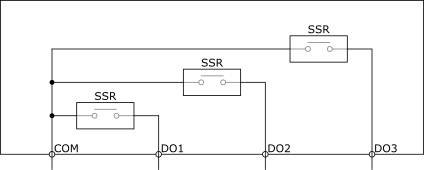Log on to rate and give feedback
1
2
3
4
5
Log on to rate
0

Concept
Products:
RP-V
Functionalities:
Hardware
Product version:
2022, 2023, 2024
3/30/2023
Solid-state Relay (SSR) Outputs
The solid-state relay (SSR) outputs can be used in many applications to switch 24 VAC or 24 VDC on or off for external loads such as actuators, relays, or indicators. SSRs are silent and are not adversely affected by relay contact wear.
The outputs can be configured as one of the following types:
Digital output
Digital pulsed output
Pulse width modulated output
Tristate output
Tristate pulsed output
Outputs
The DO SSR outputs are Form A digital outputs, which means the outputs are normally open contacts with one common terminal and one normally open terminal. The SSR outputs share a common terminal but the outputs can be controlled independently.

Figure:
SSR digital output internal configuration
Specifications
Channels, RP-V-4A
|
0
|
Channels, RP-V-5A
|
3, DO1 to DO3
|
Channels, RP-V-5C-M
|
3, DO1 to DO3
|
Output rating
|
Maximum 1.5 A load per output
|
Maximum 3 A total load for the 3 outputs
|
|
AC voltage range
|
Maximum 30 VAC
|
DC voltage range
|
Maximum 30 VDC
|
Commons
|
COM for DO1, DO2, and DO3
|
| When the SSR outputs are used to switch AC, the common terminals can be connected to 0 to 30 VAC. When the SSR outputs are used to switch DC, the common terminals can be connected to -30 VDC to +30 VDC. | |
Common voltage range (AC)
|
0 to 30 VAC
|
Common voltage range (DC)
|
-30 to +30 VDC
|
Minimum pulse width
|
100 ms
|
Solid-state relay output protection
|
Transient voltage suppressor across each solid-state relay (SSR) output
|
 RP-V Controllers
RP-V Controllers
 RP-V Onboard I/O
RP-V Onboard I/O